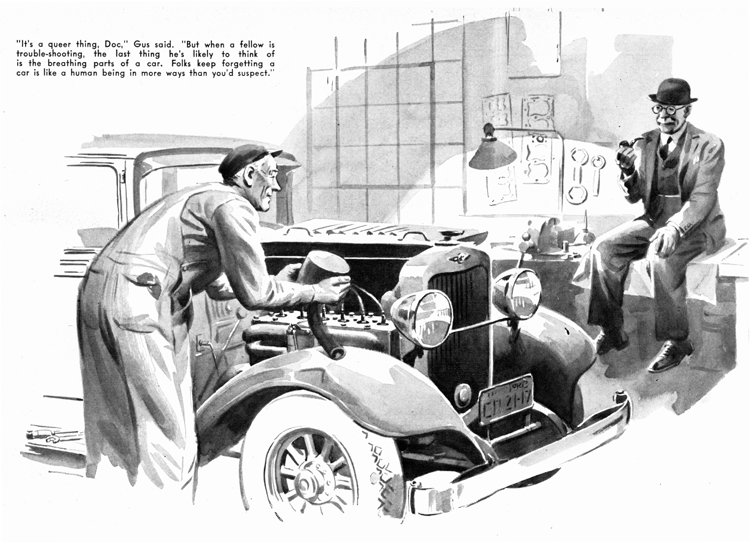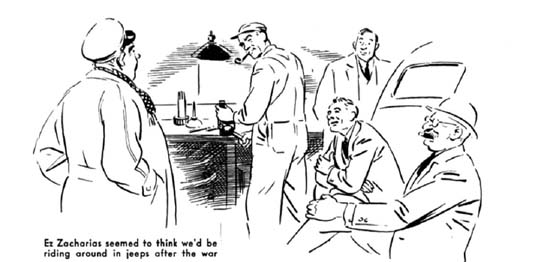April 1943
GUS FINDS TROUBLE IN THE AIR
by Martin Bunn

Gus Wilson's shop isn't nearly so frequented a gathering place these days as it used to be. Since Pearl Harbor hardly anybody in our town has time to sit and talk. But once in a blue moon a half dozen Model Garage regulars drift in and the shop slowly fills with a rich mixture of tobacco smoke and conversation. Gus always keeps plugging away at whatever job he happens to be working on, but his wide grin shows how much he enjoys these brief "gab sessions."
One of these chance get-togethers took place last week. George Knowles, who is our chief air-raid warden, stopped in to buy a couple of flashlight batteries, and was soon joined by big Ez Zacharias, the R.F.D. carrier. On his heels came Doc Marvin, smiling and genial as always, though he was dog-tired after a long day at the hospital.
"This is like old times!" Gus told us all as he straightened up from Ez's disassembled carburetor.
We discussed the war at first, but the talk soon drifted to the changes it was likely to leave in its wake. That set us all to making predictions about what after-the-war automobiles would be like. George Knowles contended that they would look like streamlined planes, because he was sure that the day the shooting stopped some of the big aircraft companies would start shifting over to the production of cars of revolutionary design. Ez Zacharias snorted his disagreement, and said that we'd be driving around in second-hand jeeps.
Gus went on with his work as he listened without saying anything. Finally someone asked him what he thought about it.
"Well," he said, "I hardly think I'll he needing a new car for a spell."
He had hardly finished speaking when a bell jangled and Joe Clark came into the shop to tell Doc Marvin that he was wanted in his office. Doc grunted and got up.
"What I came in for," he told Gus, "was to ask you to take a look at a car I've got outside. It's an old-timer that belongs to my brother, who's a farmer upstate. His little girl has been having some trouble with her ears, and yesterday it became so bad that Fred and his wife brought her down to my office.
"They had a tough trip, for the child's right ear was getting more painful by the minute, and Fred couldn't get his car to do over thirty. The moment I examined the child I knew it was a case for a specialist. So I packed Fred, his wife and their daughter in my car and had them use it to drive down to the Medical Center in the city. There just wasn't any time to lose."
The Doc tugged at his chin. "This morning Fred phoned me that the specialist had decided on an immediate operation. As a result, Fred and his wife are staying down at the Center, and I'm stuck with an old bus that wouldn't go half fast enough if I had to answer an emergency call. I don't know what's the matter with the car, but Fred says it hasn't been cutting up for more than 48 hours. I hate like the dickens to ask you to work overtime, Gus, but -- "
Gus grinned at him. "I can't make any promises, Doc, but if it's anything I can fix tonight, you'll have it in the morning."
George Knowles had a call to make and offered to drop Doc and Dave Sledd at their houses, so the three of them drifted out. Gus reassembled Ez Zacharias' carburetor, and sent the R.F.D. man on his way. Then he went to the Park House for his dinner.
He got back to the shop about 8:30. Shifting into his working clothes, he lighted his pipe, and stood staring at Dr. Marvin's borrowed car with a puzzled expression.
After a few minutes of pondering he got in and stepped on the starter. The engine took off promptly, and ran smoothly enough considering its advanced years. What was even more gratifying, when he pressed his foot gently down on the accelerator pedal the engine speeded up. But -- when he pressed harder, the engine suddenly slowed, missed, and coughed to a stop.
Gus scratched his head. "It might be the gas line," he muttered. He got out and checked the fuel pump and the fuel line but he couldn't find anything wrong with either. Then he checked the spark plugs and their wiring, but found them also in perfect condition.
Although Gus did a little mild cussing then, he was really enjoying himself. There's nothing he likes better than a good trouble-shooting job. After another session of head scratching he removed the carburetor, disassembled it, cleaned all its parts, and put it back. Then he opened the shop doors, and drove the car out for a road test.
Before he got as far as the road, a taxicab stopped at the curb, and Doc Marvin jumped out. "Hi, there, Gus!" he hailed. "Going for a joy ride? I'll come along with you."
He climbed in, and Gus drove slowly up the road. His eyes on the speedometer, he increased the car's speed in slow stages. Twenty . . . twenty-five . . . thirty . . . and the engine choked, sputtered, and stopped.
"I'll be damned!" Gus said with feeling.
Dr. Marvin laughed. "It's been acting that way for two days," he reminded Gus. "There must be a reason."
In grim silence Gus started the engine again, and drove back into ghe shop. They both got out. "This one has me way out on a limb!" Gus confessed with a wry grin.
The doctor nodded sympathetically. "It's a funny thing, Gus. For the last week I've had a hunch that something bothersome was going to happen, a sort of feeling of trouble in the air."
Gus stared and his mouth dropped open. "What was that you said?" he demanded. "Trouble in the air? Holy sufferin' cats! I am dumb!"
Two long strides took him to the car. Dr. Marvin watched him as he worked over the engine. Suddenly Gus closed down the hood. "Come on, Doc," he said. "Let's take another ride. This time we'll move!"
They got back into the car, and Gus drove it out of the shop. As soon as they were on the road, he increased speed. The speedometer began to climb. Twenty . . . thirty . . . forty . . . sixty!
"Holy smoke!" Gus exclaimed. "She's traveling like a bird now."
Back at the shop, Gus removed the air cleaner -- it was of the oil-bath type, mounted on the side of the engine, with a rubber hose extending to the carburetor. The inside of the hose had weakened at one point, so that it curved slightly on its way to the carburetor. Every time the engine was accelerated the suction caused the hose to close gradually until, when the car was going about 30 miles on wide-open throttle, the hose closed up completely, shutting off the air supply to the engine.
"There's the cause of all the grief," Gus said, pointing to the hose.
"But what the dickens flattened out the hose?" Dr. Marvin gasped.
Gus poked a forefinger into a sticky mess on the filter screen. "Some time ago," he guessed, "your brother had his air cleaner checked. Whoever did the checking refilled the oil bath 'way above the proper level -- and forgot to clean the screen. It was the carburetor suction that collapsed that hose.
Dr. Marvin beamed expansively. "Right," he said. "But there's one thing I still don't understand. You said you were stumped. Then all at once you knew what was the matter. How come?"
Gus laughed. "When a fellow is trouble-shooting, the last thing he's likely to think of is the air cleaner -- in spite of the fact that for every gallon of gasoline you burn, just about 10,000 gallons of air have to pass through the cleaner. Well, Doc, I ran true to form and didn't think of that angle -- and maybe I wouldn't have thought of it yet if you hadn't made that remark about 'trouble in the air'!"
END
L. Osbone 2019
